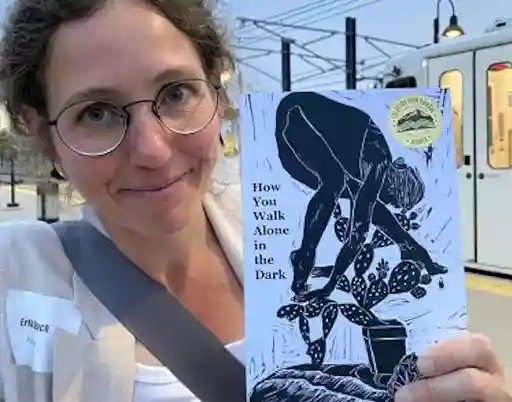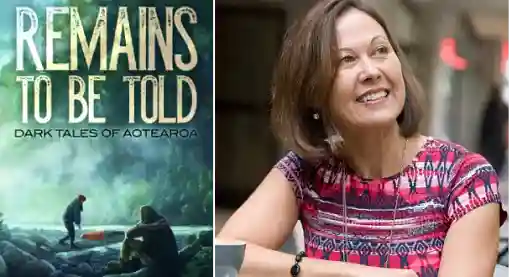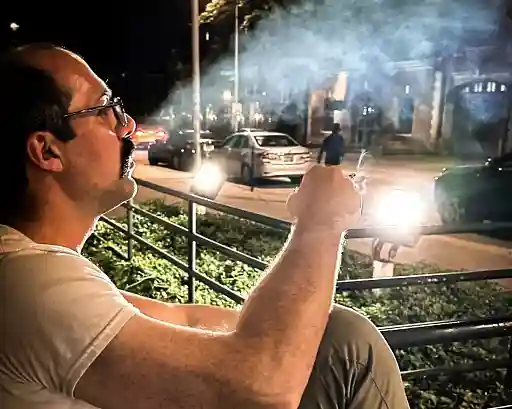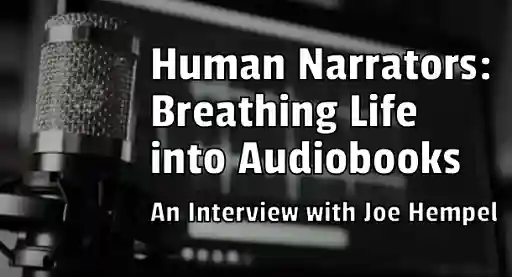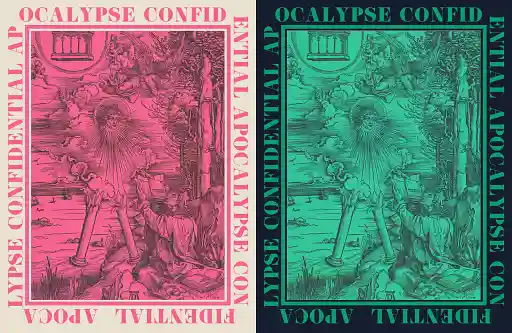Photo courtesy of the author
Gemma Amor is the Bram Stoker Award nominated author of Dear Laura, the collections Cruel Works of Nature and These Wounds We Make, the novel White Pines, and the upcoming novel Six Rooms. Her work has appeared on The NoSleep Podcast and the Shadows at the Doors podcast. Her most recent book is the novella Girl on Fire. She is also an accomplished artist and has created much of the artwork for her own book covers.
Obviously this year has derailed any sense of "normal life," so I'm curious about what your writing habits were pre-pandemic, and how you've adapted to the new version of the world. Is there a specific time of day you sit down to write? Do you have a word count goal?
Hoo boy, this one cuts to the core. Life before this pandemic feels like a dream; a lovely, warm, rose-tinted dream in which I could go anywhere and do anything I wanted without question, or repercussion. I don't think I ever fully appreciated the scope of my personal freedom before this, and will never take it for granted again, because trying to reach any creative harmony with the way things are now has been nigh on impossible.
My pre-pandemic writing routine was carefully designed to complement my commitments as a parent and my mental health, meaning that after dropping my son at school, I would head straight to either my favorite cafe or my home office and write, non-stop, from 9 a.m. to 1 p.m. every day, with a small break for the school run, and another hour or two usually in the evening of artwork, any voice work I had to edit or record, and admin. Obviously, with schools closed across the country for months on end, that routine has been dumped in the river, and the resulting schedule is a bit of a muddled mess of whenever I can squeeze any writing in between sharing my home space with my spouse and my son. I also have realized that a key ingredient to creativity is being alone, and isolation with two other humans in a relatively small abode has not been very conducive to producing the next New York Times bestseller. However, we have cobbled together some semblance of an existence that allows me some time to write, and like most people, I've learned to embrace radical acceptance, adapt, and be grateful for my health and the health of my loved ones. Boy, am I tired though.
As for word count goals: unless I have a specific deadline, I try not to hold myself to daily word goals. I consider any words on the page a major success, and I am fully aware that even if you do hit the magical target word count number on one day, the very next day you might turn around and delete everything you wrote the day before, so my goals are focused purely on the story. If I'm moving the story forward, then I'm happy.
I love that, moving the story forward being the goal. Speaking of, what is your entry point to a story? Is it the idea, the plot, the characters? And do you know right away if the piece will be a short story or something longer?
It could be a number of things, depending on what has triggered the idea: a song, a movie, something I spot whilst out on a walk—the depth and scale of the idea sometimes dictates the entry point, if that makes sense. I often start with a scene, a visual that has popped into my head that I can't shake: a cow treading on a man's skull, a woman walking through a forest, a Christmas tree hung with grisly decorations. I think I have a fairly cinematic mind and so I usually find myself with an image or scene that begs to be written, and the rest follows around it.
Sometimes, as with Girl on Fire, a character springs into existence and the story weaves itself around them instead. I'm notoriously reluctant to plot, because I find it stifles my enthusiasm for writing, but have been known to pants-plot, where I do a rough outline and let the story go where it will within the confines of a few rules. That being said, my novel White Pines just refused to conform to multiple plots, despite me replotting four times, so in the end I admitted defeat and let the damn book write itself. As for length, there is a bit of a running joke with some of the editors I work with that I can't actually write a 'short' short story—most of my stuff that isn't a novel seems to naturally come in around a minimum of 10K words. I am rigorously relearning the craft of shorter stories, although it has to be said—almost everything I write usually begs to be written out, rounded out, fleshed out, whatever you want to call it. So it's a question of discipline, and understanding when less is more, depending on the theme or the hook of the story itself.
Writing to an outline seems very rigid, but it also seems that being a “pantser” means a lot of backtracking and editing to correct new pathways that get revealed during the writing process. What does editing look like for you? And at what point do you call the work finished?
I tend to rigorously edit as I go. In fact, at times I have to tell myself to stop editing so I can actually move forward and get the words down—it is far too easy to edit yourself into a hole, otherwise, and this is something that stopped me from finishing a manuscript for many, many years—being a bit obsessive over it.
So these days, I have reached a compromise with myself—I’ll get the first 30 or 40K down, and go back over that once or twice so that the beginning of my novel is super sharp. Then I'll use this as a platform to dive into the stodgy middle part of a novel, which I traditionally hate. Once I'm about 70K in I do another round of edit sweeps, then I write the end and do one final pass. It doesn't matter how many times I edit though—I'm never really fully happy with a story. I call it finished when it finishes itself, if that makes sense—I usually just grind to a sudden halt and realize that I've done what needs to be done, and then comes the going back and adding more finesse. Bascially, I'm a mess with edits. Ha!
I love the idea of getting the first third of a novel really sharp before moving forward. Is this something you learned through trial and error?
I think it just motivates me, reading something that feels more finished. I can feel proud of the story and use that to fuel the rest. Confidence is a major issue at times, and it helps to be able to use your own writing to spur you on.
The first book you published was a collection of short stories, followed by a novella—was this a conscious decision to release shorter works instead of a novel, or were you putting out what you had at that time?
A little of both. Short stories were my entry point into writing again, because I had to learn how to *finish* something—I had, over the years, abandoned about twelve different novels and manuscripts, because I just couldn't sustain the momentum needed to finish a book. Writing a novel takes a certain amount of skill and strategy, and I had neither, but I learned them slowly by writing shorts. So when I first began, a few years ago, to take writing seriously again, I stumbled across an amazing horror anthology audio drama podcast called The NoSleep Podcast, which I quickly became addicted to. Before long I discovered they accepted submissions, so I thought “What the fuck, why not?” The story I sent to them was accepted, and I built up a lovely relationship with the team there that meant I just kept writing stories. Before I knew it, I had enough for a book, and so I decided to publish a collection. And I haven't looked back since.
I'm still learning the craft of longer formats, it’s also important to say. So shorter stories and novellas do appeal to me, because also—a story doesn't always need 100K. Sometimes, 30K will do, or 10, or 5. It depends on the idea, and the story.
You mentioned earlier not ever really being happy with your stories, but considering them "finished" at some point. Are there any short stories, particularly from your two collections, you are especially proud of? If so, what about them gives them a special place in your heart?
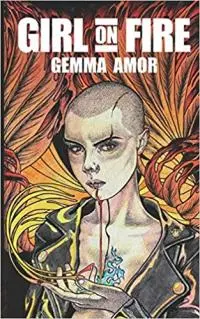 It is so difficult to choose an absolute favorite story out of everything I have written, because each piece is representative of a certain period in my life, or issue I wanted to work through, or person I wanted to immortalize, or idea I wanted to explore. I very rarely put out anything that doesn't have an emotional purpose, if that makes sense, so it is a little like trying to choose a favorite child—I am not sure I can do it. There are a few stories, however, that I go back to again and again when referring others to my work. “Foliage” is an important one for me, as it was a direct tribute to Jeff Vandermeer's Area X trilogy, a series of books that captured my imagination like nothing else. “Foliage” was a love letter to Annihilation, the first book in the trilogy, and also my first real success on The NoSleep Podcast, who adapted it for audio. I realized then that the stories that put character front and center felt better—better to write and certainly felt better to read or listen to, and it taught me a lot about plotting and continuity, as well. There are a few glaring plot holes that don't spoil the overall enjoyment of the tale, but do annoy me, and I have subtly been tweaking these over subsequent versions of my book Cruel Works of Nature, where the story features.
It is so difficult to choose an absolute favorite story out of everything I have written, because each piece is representative of a certain period in my life, or issue I wanted to work through, or person I wanted to immortalize, or idea I wanted to explore. I very rarely put out anything that doesn't have an emotional purpose, if that makes sense, so it is a little like trying to choose a favorite child—I am not sure I can do it. There are a few stories, however, that I go back to again and again when referring others to my work. “Foliage” is an important one for me, as it was a direct tribute to Jeff Vandermeer's Area X trilogy, a series of books that captured my imagination like nothing else. “Foliage” was a love letter to Annihilation, the first book in the trilogy, and also my first real success on The NoSleep Podcast, who adapted it for audio. I realized then that the stories that put character front and center felt better—better to write and certainly felt better to read or listen to, and it taught me a lot about plotting and continuity, as well. There are a few glaring plot holes that don't spoil the overall enjoyment of the tale, but do annoy me, and I have subtly been tweaking these over subsequent versions of my book Cruel Works of Nature, where the story features.
Additionally, my story “Justine” is a take on the myth of Eurydice and Orpheus and their journey back from Hades. I wrapped it around a narrative of victimization and survival, and I think it might be one of my braver stories—it is certainly the story that people mention the most from my collection, These Wounds We Make.
I'm also extremely fond of Girl on Fire, which is why I have gone on to expand that short story into a series of novellas. The character of Ruby Miller is the first openly anti-hero character I've invested in to this degree, and I am enjoying exploring the concept of female rage, redemption, and criminality. Ruby is also the lynchpin that ties together all my short stories and novels (with the exception of Dear Laura) into a single universe (the Amorverse as someone called it the other day) and I am having stupid amounts of fun with that—I always wanted to build my own Castle Rock, so to speak, and Ruby is letting me do it in grand style.
I think the other story worth mentioning is “Angel”, from the charity anthology I edited called We Are Wolves. It is a direct answer to a true-life child neglect case I first heard about on a podcast, and I was so upset and appalled, I had to work through some stuff. "Angel" is certainly one of the most raw things I've written of late, and I do have a tendency to flay myself in every story, so I suppose that's saying something.
What can you tell us about what you’re working on right now, and what you have coming out later this year?
I have all my fingers and toes crossed for some VERY exciting things I can't talk about, which is always a nice thing as a writer to be able to say. In terms of stuff I can tell you about, I'm currently finishing up a haunted house novel (I've been itching to write one for years) for Cemetery Gates Media, called Six Rooms—I'll leave you to figure out the general gist of that book ha ha. It's a lovely project for me because it is heavily character and detail focused, and it means I can play with two of my enduring loves—history and architecture. It also allows me to lighten up a little, which is nice—a lot of the stuff I wrote last year was bleak and heavy (2020 was a mood) but this is somewhere in between Clue and Hill House in terms of tone, and I'm enjoying it immensely.
Aside from that, when I have space I intend to publish another short story collection called Fear to Tread, which is a collection of horror stories set in far flung places around the world (and an alternative world). In 2010 I quit my job and travelled around the world for 13 months, visiting some incredible places like Mongolia, Easter Island, the Galapagos and Antarctica amongst others—so this collection features some of my favorite locations, and combines my travel journals with fiction. I also plan on stealth-dropping another work at some point but I'm going to keep schtum about that for now, because I like dropping things when people least expect them.
Beyond that, I've been working on a screenplay for a short movie with a writing partner who brought me on board (it deals with postnatal trauma) and filming should start on that soon, which is hugely exciting. I am also hoping to lock down season two of horror comedy podcast Calling Darkness with my co-creator S.H. Cooper.
I'll also be doing more stuff with the wonderful, gentile, M.R. James themed podcast Shadows at the Door, and of course, working with The NoSleep Podcast on a thing or two. I'm also dipping my toes into writing for a video game which has just secured funding, so that's exciting. And around all of this, I've just started querying to see if I can secure some representation—although time-wise it’s proving difficult to attack that quite as rigorously as I would like!
What are some of the books that really hit you in an intense way, and maybe even altered how you see storytelling, writing?
Books that hit me in a hard way is a tough one, because there have been so many over the years, but I think the novel that wrecked me emotionally the most and also blew me away with its unconventionality and strength of voice was The Raw Shark Texts by Steven Hall. I won't give too much away about the plot, because the beauty of this book is trying to figure out what the hell is happening as you read it, but it broke my soul and taught me a lot (as did Stephen King and Angela Carter) about how to tap into human emotion when writing fiction. And that, for me, has been the whole foundation of my writing and I think helped me to develop my voice. I write about people and characters first and foremost—their hopes, fears, feelings, desires, motivations. Horror as a genre is almost secondary to that. I work the horror elements in around the people I write about, if that makes sense. But really, there are so many books, so many, that left a mark. Fiction is a wonderful, transporting thing and as an only child I consumed a hell of a lot of it.
Get Girl on Fire at Bookshop or Amazon
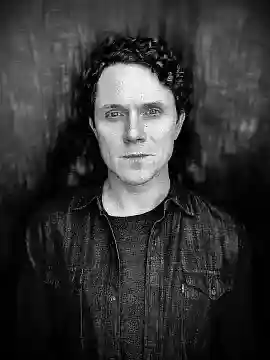
About the author
Tyler Jones is the author of Criterium, The Dark Side of the Room, Almost Ruth, Burn the Plans (one of Esquire's “Best Horror Books of 2022”), Heavy Oceans, and Midas.
His work has appeared in numerous magazines and anthologies including Cemetery Dance, LitReactor, PseudoPod, Tales to Terrify, and The NoSleep Podcast.
He lives in Portland, Oregon.
